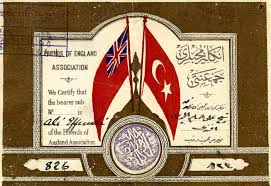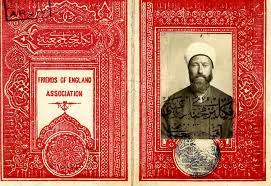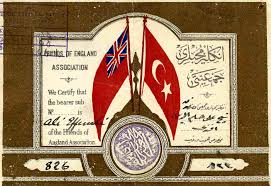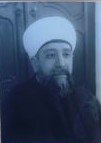
FRIENDS OF ENGLAND ASSOCIATON
At the Vienna Congress convened following France's defeat against the allies in 1815, the cunning diplomat Talleyrand, by going with the flow, managed to secure France's avoidance of punishment and a return to its old borders. Far from being accused of treachery, he earned the admiration of almost everyone.
The position of Ottoman administrator towards the victors of World War I was no different. They believed the occupation temporary, tried to appease without provoking, and sought to make favorable peace deals, aiming to liberate the country from occupation.
One such attempt was the Friends of England Association, often discussed under the heading of “Harmful Societies” in the history lessons of Republic of Turkey.
The information about the association in Nutuk (The Speech by Mustafa Kemal), published in 1927, forms the basis of the official ideology. There hasn't been much scholarly work on the subject, and what has been done tends to repeat the same perspectives.

Elite Club
The Friends of England association was established on May 20, 1919, following the occupation of Izmir (Smyrna). One of the founders, Said Molla, sent telegrams to all municipalities on May 23, informing them of the establishment of the association and requesting support. Branches of the association were opened in the provinces. The fact that the number of members reached 53,000 within three months even surprised the British.
Said Molla (1880-1930) hailed from a scholarly family and was the nephew of Sheikh al-Islam Cemaleddin Efendi. He completed his education at the Fatih Madrasa and Madrasa al-Qudat. He served as a qadi (judge), a bureaucrat in the office of Sheikh al-Islam, a member of the Council of State (Şura-i Devlet), and an undersecretary at the Ministry of Justice. Later, he ventured into politics and became a staunch opponent of the Committee of Union and Progress (CUP, i.e. the Young Turks).
The association included individuals with diverse backgrounds such as diplomats, military, civil, and judicial bureaucrats, parliamentarians, writers, scholars, as well as numerous women from the upper class. Among them were Fatma Aliye Hanim, the daughter of Cevdet Pasha, and Celile Hanim, the mother of Nazım Hikmet, socialist poet of the future. Members of the association also included prominent figures such as Sheikh al-Islam Mustafa Sabri Efendi, Colonel Sadık Bey, Interior Minister Memduh Pasha, Cemil Pasha (ex-mayor of Istanbul), philosopher Rıza Tevfik, journalist Refik Halid, journalist Refi Cevad, and journalist Abdullah Cevdet.
The initial executive board of the association consisted of the following individuals: Adil Bey, General Manager of Land Registry and Cadastre (honorary president), Nazım Pasha, Governor of Thessaloniki (president), Mirliva Hamdi Pasha (acting president), and Nazım Pasha, Governor of Syria (vice president). Members of the executive board included Asaf Bey, Secretary of the Imperial Council, Subhi Bey, Mayor of Istanbul, Nebil Ziya Bey, Commissioner of Companies, Feriq Enver Pasha, Sheikh Ömer Ziyaeddin Efendi of Dagestan, Colonel Abdurraif Bey, Safiyüddin Bey, Governor of Shkodra and Director of the Economy Bank, Cemal Bey, Governor of Amasya, Vahid Bey, Head of the Commission for Migrants, and Mahmud Celaleddin Bey, Governor of Gümüşhane.
It's evident that the members of the association were not ordinary individuals. Therefore, concerns about its potential influence and impact were one reason for the harsh reactions shown by certain segments towards the association.

Association and Protectorate
Articles supporting the policies and ideas of the association were written in Istanbul newspapers such as Alemdar, Peyam-ı Sabah, Mefkûre, Mesuliyet, and Yeni İstanbul; propaganda was made to avoid any public actions that would provoke the British.
In the declaration published in Vakit newspaper of the Friends of England Association on September 4, 1919, it states: "Our association loves its homeland above all else and considers it necessary and important to maintain friendly relations with England due to this affection. However, our association has not supported, and cannot support, any intervention by England or any other state that would compromise our independence, let alone subjecting ourselves to their protectorate."
Refi Cevad penned an ironic article opposing the idea of becoming a American protectorate, suggesting that it would spark the resurgence of the Young Turks, and arguing that becoming a British protectorate was preferable (Alemdar, August 1, 1919). Some saw this as beneficial in deducing that the association was in favor of becoming a protectorate.
Don't Assume Them As "Muhib"
In Nutuk, it is argued that the name “Muhib” (friend) does not imply the existence of a association composed of those sympathetic to the British (i.e., there is no problem in being sympathetic to the British), but rather suggests that the founders of the association were primarily concerned with their personal interests, hoping to achieve them through British patronage.
Mustafa Kemal states in Nutuk that these unfortunate individuals did not even consider whether the British were aiming to preserve and protect the Ottoman State as a whole. This is the key point. He was aware that England would ultimately destroy the Ottoman State.
On October 21, 1919, the Amasya Protocol was signed between Mustafa Kemal and the Minister of the Navy, Salih Hulusi Pasha. Its secret sixth article pertains to preventing the membership recruitment activities of the Friends of England Association.
Although in Nutuk it is stated that Sultan Mehmed VI and Damad Ferid Pasha were members of the association, this is not true. The dynasty could not be members of a society or an association. The official list of founders, administrators, and members of the association is known. In the same place, it is implied that the leader of the association is Reverend Robert Frew, suggesting British involvement.

Reverend's Cunning
In Nutuk, it is narrated that 12 letters allegedly written by Said Molla to Reverend Frew between October 11 and November 5, 1919, somehow fell into the hands of the Ankara Government. The contents of these letters involve measures to be taken for the dissolution of the Kemalist Forces, which were seen as a rebellion movement that would provoke the British.
It is generally believed that the association was behind the uprisings that erupted throughout Anatolia against the Ankara movement. Mustafa Kemal Pasha, based on the information in Nutuk, wrote a letter to Reverend Frew, whom he knew from Istanbul, requesting the cessation of these activities.
Over time, similar-minded societies were established, and towards the end of 1921, as the political situation became clearer, the influence of the association gradually diminished.
Following the victory of the Ankara movement, some members of the association who, like Abdullah Cevdet, who did not pledge allegiance to the new authority, were either forced to leave the country or were stripped of citizenship and subjected to exile by being placed on the infamous “150 list.”
Opposition and Collusion
Hüsameddin Ertürk, one of the prominent members of the Young Turks, the former head of the Special Organization, and an important figure in the Ankara movement, says even more interesting things: "Reverend Frew has claimed that if an Friends of England Association is established and especially if turbaned religious scholars are imported here, it would be possible to win over England, and in the treaty to be signed, the conditions would be drafted quite lightly thanks to England's support."
Imams of mosques, scholars, pulpit preachers, leaders of the Bektashi Order, and various members of religious sects in Istanbul outwardly joined the Friend of England Association, but secretly exerted their efforts to undermine this association with all their might.
“In this Friends of England Association, there were many individuals who, while ostensibly serving our secret organization and the national front, were actually deceiving all traitors, especially Reverend Frew.” (İki Devrin Perde Arkası - Behind the Scenes of Two Eras, 470-471)

Charm Offensive Tactic
The association openly and vehemently opposed the Ankara movement, which it saw as rebellious against the Sultan and the legitimate government, believing that this would provoke the British and lead to the occupation of even the unoccupied regions of the country, increasing enemy pressure.
Therefore, describing its founder Said Molla and its members as British agents is absurd. Treachery depends on the perspective from which the issue is viewed. The members of the association are no less patriotic than the members of the Ankara movement. Alas, history is written by the victors.
The reason for the establishment of the Friend of England Association, as its name suggests, was to appear favorable to England, the game-changer and the superpower of the world at that time, and to overcome the disastrous days through dialogue. Otherwise, almost everyone knew England and its policies “well enough not to be Muhib" anymore.
.jpg)
Naivety of The Association
At that time, quite understandably, there were many who shared the same thoughts as the association. Some of them, like Abdullah Cevdet and the last leader of the association, Şevket Bey, later joined the Anatolian movement.
The fault of the Friend of England Association lies in not abandoning its sincere ideology and failing to realize England's double game, showing its naivety. The British had no direct connection to the association, and they didn't even appear as supporters because they feared it would disrupt their real policies.
According to his writings in the Minber newspaper during the Armistice period, it is understood that Kemal Pasha's ideas parallel those of the association. In fact, it wouldn't be an exaggeration to say that if there hadn't been the Ankara movement, most of its members would have likely been part of the Friends of England Association.
Although the association was openly opposed to becoming a protectorate, it was labeled as the supporter of British protectorate. However, individuals who openly advocated for becoming an American protectorate, like İsmet Pasha, have wielded influence over the country's fate for years. Truly, wonders never cease.
Transition from War to Peace
Hilmi Kamil Bayur, the son of the former Grand Vizier Kamil Pasha and a diplomat during the republic era, stated that his two brothers, Şevket and Abdullah Bey, joined the association, but they did not engage in activities parallel to Said Molla. Indeed, Kamil Pasha's other two sons, Yusuf Hikmet and Salahaddin Bey, as well as his son-in-law Naci (İldeniz) Bey, actively participated in the Ankara movement.
Ziraat Bank General Manager Şevket Bey and his brother Abdullah Bey, who served as the Minister of Trade and Mines in the Tevfik Pasha cabinet, described their reason for joining the association as "to assist in the establishment of historical Turkish-British friendship as soon as possible in order to alleviate the dire consequences of the war for us."
Hilmi Bey says: “Both of them were calm, sensible individuals who stayed away from political factions and politics. One excelled in banking, while the other served successfully in the State Council for years. The German writer Jaeschke who [writes about this issue and] narrates articles about the Friends of England Association from the Alemdar newspaper during the Armistice days, does not know this aspect. After the Ankara movement succeeded, nobody cared about Şevket Bey becoming the leader of the association; he had taken up a position as a consultant in the Ziraat Bank community.
It is well known that even during the discussions of the Armistice at Mudros, the chief Turkish delegate Rauf Bey and Grand Vizier İzzet Pasha openly and officially expressed their desire to revive the historical Turkish-British friendship at every opportunity. Similar events have been observed in defeated countries during the transition from war to peace at the end of the Second World War.” (Hayat Tarih Magazine, May 1972)
Önceki Yazılar
-
THE OTTOMAN DYNASTY AND QURAYSH9.07.2025
-
"WOE TO THE ENEMIES OF THE REVOLUTION!" What Was The People’s Reaction To The Kemalist Revolutions?2.07.2025
-
DEATH IS CERTAIN, INHERITANCE IS LAWFUL!25.06.2025
-
THE SECRET OF THE OTTOMAN COAT OF ARMS18.06.2025
-
OMAR KHAYYAM: A POET OF WINE OR THE PRIDE OF SCIENCE?11.06.2025
-
CRYPTO JEWS IN TURKEY4.06.2025
-
A FALSE MESSIAH IN ANATOLIA28.05.2025
-
WAS SHAH ISMAIL A TURK?21.05.2025
-
THE COMMON PASSWORD OF MUSLIMS14.05.2025
-
WERE THE OTTOMANS ILLITERATE?7.05.2025